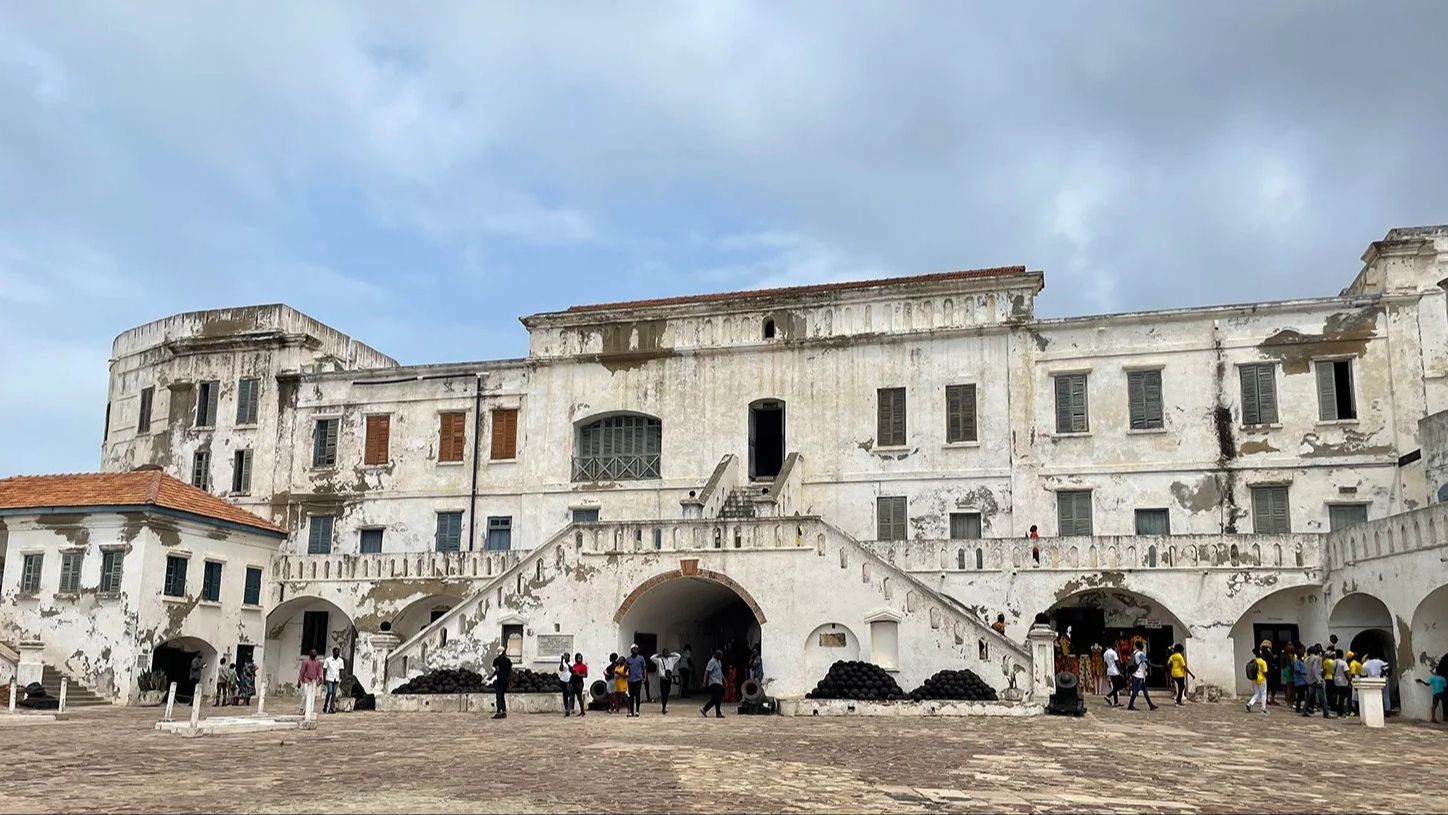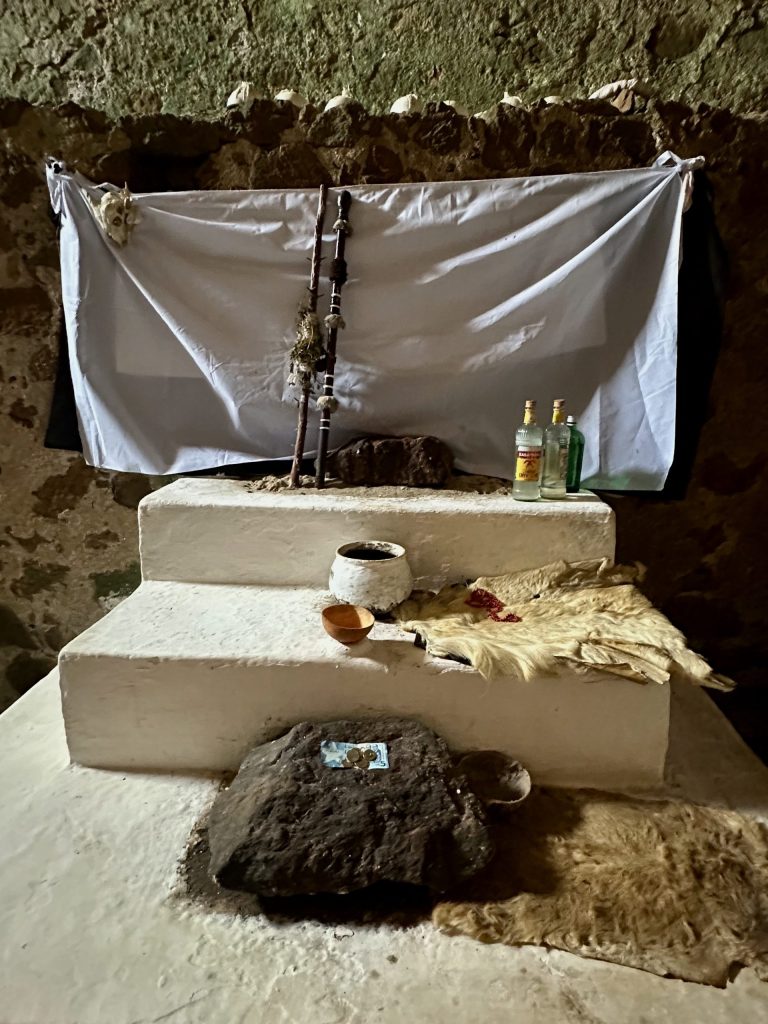The Ancestors Were Speaking: My Pilgrimage to Ghana
Jul 03, 2025
An origin point in the transatlantic slave trade, Ghana has become a destination for Black Americans like the author — people who want to learn more about America's "original sin," or who are seeking to reconnect with their heritage in an act of racial healing. The journey, she writes, was profound and emotional. Credit: Denim Fisher
Every year, tens of thousands of African Americans — including former President Barack Obama and Kendrick Lamar — flock to Ghana to reconnect with their African roots. And Ghana encourages them to come home.
Overview:
As a point of origin in the transatlantic slave trade, Ghana has preserved forts and dungeons where countless enslaved people were bought and sold ahead of the harrowing Middle Passage. These facilities were the last glimpse they had of their homeland before being put to work on a plantation.
Not long after arriving in Accra, Ghana, from Nantes, France, I found myself on a three-hour bus ride heading for the coast. Our tour group, consisting mostly of young Black Americans, was headed to a destination that stirred up mixed emotions: Cape Coast Castle, one of the forty dungeons built on the Gold Coast of West Africa.
As the bus banged along the dirt road, I caught fleeting glimpses of sights both foreign and familiar: A woman walking with a purse on her head and a baby wrapped on her back; three boys on a wooden bench, engrossed in a game. All the faces were melanated, like mine.
I’m a student at Spelman College in Atlanta, a historically Black women’s college, studying the transatlantic slave trade and its impact on contemporary societies. I am familiar with my HBCU and haven, a microcosm of Blackness but not an entire society.
I felt a different connection in Ghana, even though I was a first-time visitor.
‘Loved in All My Blackness’
I had joined the thousands of Black Americans who flock to Ghana every year. The West African country has become a destination for people seeking spiritual and emotional refuge, as well as a potentially life-changing experience of racial consciousness.
Former President Barack Obama has made the pilgrimage. So have celebrities such as Kendrick Lamar, SZA, Chance the Rapper, Idris Elba, and Boris Kodjoe. Some tour the fortified slave ports on its coast; others receive African names in traditional ceremonies, forging closer links to their heritage. A growing number of Black Americans are moving to Ghana for good.

Tourists leave offerings to the ancestors on a makeshift altar inside a dungeon in Ghana’s Cape Coast Castle. (Credit: Denim Fisher)
“I came to Ghana to be fully seen and loved in all of my Blackness,” said Blair Moore, a rising junior at Spelman College. She took the trip, she says, was “to exist not as a ‘Black person’ defined by racial ideologies as I often am in the U.S., but simply as a person.”
Ghana, meanwhile, has embraced its role as a wellspring of racial healing. Its government includes an office that handles diaspora affairs, it has created outreach programs for descendants of enslaved people, and its immigration laws include special provisions that streamline their path to Ghanaian citizenship.
Year of Return
In 2019, the Ghanaian government declared the Year of Return initiative, marking 400 years since the first Black people were stolen from West and Central Africa and taken to the U.S., Brazil, and the Caribbean, never to return.
The global campaign invited members of the African diaspora to return to their ancestral homeland. Black people from Canada, Jamaica, the U.S., and other countries answered the call.
Encouraging racial healing, however, has been good for the country’s economy. In early 2024, Ghana saw $1.8 billion in revenue from tourism visits. While the exact number of Black Americans among the million tourists is unknown, there are reports that about 1,500 people moved from the U.S. to Ghana after the Year of Return. And in November 2024, 524 diaspora members — mostly Americans — were granted Ghanaian citizenship in a ceremony.
It was easy for me to understand why people would want to call Ghana home. From my first moment exiting the plane into the steamy tropical weather to the chatter that filled the air from street porters and everyday people, the country felt familiar and new at the same time.
That feeling deepened during a visit to the National Archives, when a clerk spoke to me in Twi, the native language. When I didn’t answer, another woman asked, “Do you know what she said?” I told her no, and she asked if I was Ghanaian.
I hesitated, then answered, “I am not sure. I am from the U.S. But I am interested in learning where I come from.”
‘What Do We Owe Our Ancestors?’
That lesson took a profound turn when our tour group arrived at Cape Coast Castle. I was 5,397 miles from home, and felt the ancestors’ presence.
A heaviness enveloped me as I entered the compound of low white buildings and dungeons guarded by long-silent cannons — the last things enslaved Africans would see before enduring the harrowing Middle Passage. We visited Asin Manso, where captives had their final bath, and toured the cells that held countless men, women, and children before they were sold into enslavement.
I observed an altar with bottles of kesapreko, an herbal beverage, along with Ghanaian cedis, and animal skins. Across the room, there were memorial hearts honoring the captives.
My sandals were on the same stones and floors they had trod on their one-way journey. I offered no words; the ancestors were speaking to me. I had to pay attention.
I could almost sense the desperation of the captives. I practically felt the weight of the iron shackles on their wrists, ankles, and necks. I struggled to comprehend the cruelty of trafficking enslaved humans who looked like me.
My lasting takeaway from Cape Coast Castle is inspired by Kwame, a guide at Asin Manso.
“If it weren’t for our ancestors, where would we be?” he asked. “What do we owe to our ancestors?”
Stay connected with news and updates!
Join our mailing list to receive the latest news and updates from our team.
Don't worry, your information will not be shared.
We hate SPAM. We will never sell your information, for any reason.

